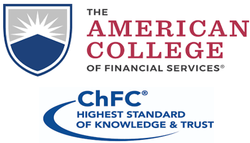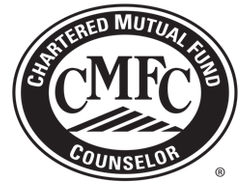Designations
 The CFP® certification is a voluntary certification; no federal or state law or regulation requires financial planners to hold CFP® certification. It is recognized in the United States and a number of other countries for its (1) high standard of professional education; (2) stringent code of conduct and standards of practice; and (3) ethical requirements that govern professional engagements with clients.
The CFP® certification is a voluntary certification; no federal or state law or regulation requires financial planners to hold CFP® certification. It is recognized in the United States and a number of other countries for its (1) high standard of professional education; (2) stringent code of conduct and standards of practice; and (3) ethical requirements that govern professional engagements with clients.
To attain the right to use the CFP® marks, an individual must satisfactorily fulfill the following requirements:
Education – Complete an advanced college-level course of study addressing the financial planning subject areas that CFP Board's studies have determined as necessary for the competent and professional delivery of financial planning services, and attain a Bachelor's Degree from a regionally accredited United States college or university (or its equivalent from a foreign university). CFP Board's financial planning subject areas include insurance planning and risk management, employee benefits planning, investment planning, income tax planning, retirement planning, and estate planning.​
- Examination – Pass the comprehensive CFP® Certification Examination. The examination includes case studies and client scenarios designed to test one's ability to correctly diagnose financial planning issues and apply one's knowledge of financial planning to real world circumstances.
- Experience – Complete at least three years of full-time financial planning-related experience (or the equivalent, measured as 2,000 hours per year).
- Ethics – Agree to be bound by CFP Board's Standards of Professional Conduct, a set of documents outlining the ethical and practice standards for CFP® professionals.
- Continuing Education – Complete 30 hours of continuing education every two years, including two hours on the Code of Ethics.
 Candidates for the ChFC® designation must complete a minimum of nine course and 18 hours of supervised examinations. They must also fulfill stringent experience and ethics requirements. Over 50,000 individuals have been awarded the ChFC® designation since its inception in 1982 and the credential is widely regarded as the highest standard of knowledge and trust for financial planning professionals.
Candidates for the ChFC® designation must complete a minimum of nine course and 18 hours of supervised examinations. They must also fulfill stringent experience and ethics requirements. Over 50,000 individuals have been awarded the ChFC® designation since its inception in 1982 and the credential is widely regarded as the highest standard of knowledge and trust for financial planning professionals.
The ChFC® program prepares professionals to help meet the advanced financial needs of individuals, families and small-business owners. ChFCs can identify and establish specific goals and then formulate, implement and monitor a comprehensive plan to help achieve long term objectives. Individuals who earn a ChFC® can provide professional advice on a broad array of financial topics including fianancial planning, wealth accumulation and estate planning, income taxation, divorce planning, life and health insurances, business taxation and planning, investments and retirement planning.
The American College is the nation's largest non-profit educational institution devoted to financial services. Holding the highest level of academic accreditation, The College has served as a valued business partner to banks, brokerage firms, insurance companies and others for over 86 years. The American College's faculty represents some of the financial services industry's foremost thought leaders. For more information, visit TheAmericanCollege.edu
 CMFC® Chartered Mutual Fund CounselorSM
CMFC® Chartered Mutual Fund CounselorSM
Individuals who hold the CMFC® designation have completed a course of study encompassing all aspects of mutual funds and their uses as investment vehicles. The program is designed for approximately 120-150 hours of self-study. The program is self-paced and must be completed within one year from enrollment.
 CFSTM Certified Fund Specialist™
CFSTM Certified Fund Specialist™
Individuals must have a bachelor's degree or 2,000 hours of financial services work experience. A six-module self-study program provided by IBF is also a pre-requisite for taking the exam. The CFS certification requires three proctored, online exams and a case study for completion.